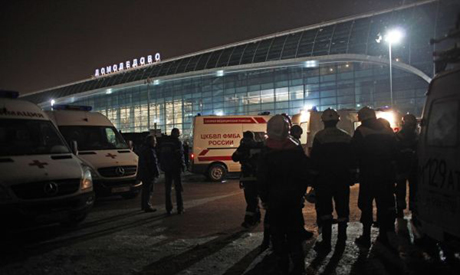
Ambulance vehicles and emergency workers are seen in front of Domodedovo airport in Moscow, Monday, 24 January 2011. (AP)
Russia President Dmitry Medvedev on Tuesday called an apparent suicide bombing that killed 35 people at a packed Moscow airport a well-planned act of terror that triggered a national "tragedy".
Monday's Domodedovo airport blast put the country on high alert and saw Russia receive an outpouring of support from international capitals as well as the United Nations and NATO.
It also prompted Medvedev to call an emergency Kremlin meeting and postpone a trip to the Davos international investment forum at which he was due to trumpet Russia's resurgence in a keynote address.
"Based on (the bomb's) location and other indirect evidence, this was a well-planned act of terror that aimed to kill as many people as possible," Medvedev said in nationally televised remarks.
But the Kremlin chief faulted airport security and said that Domodedovo's management would be held accountable for lapses that facilitated the attack.
"What happened demonstrates that there were clear security breaches. Someone had to try very hard to carry or bring through such a vast amount of explosives," the news agency quoted Medvedev as saying.
Initial reports said the blast had the force of between five and seven kilogrammes (11 and 15.4 pounds) of TNT.
Moscow's second devastating attack in less than a year prompted commentators to link the blast to the continued turbulence on Russia's North Caucasus and lament that little had been done to improve security in recent years.
Survivors said people were torn to pieces from a bomb that appeared to be filled with nuts and bolts.
The blast represented a major setback for Russia's international image and confidence in its security as it gears up to hold two major sporting events: the Winter Olympics in 2014 and the 2018 World Cup.
Prime Minister Vladimir Putin, who spearheaded Russia's campaigns for the right to host both events, has said little about the incident except for issuing instructions concerning medical assistance and other help.
But the bombing drew an instant response from global leaders. US President Barack Obama called the attack "outrageous" while German Chancellor Angela Merkel described it as "cowardly".
Chinese President Hu Jintao sent a message to Medvedev saying that his country "condemns terrorist attacks of any kind and resolutely supports Russian measures to fight terror."
"We should never allow the terrorists to win," said British Prime Minister David Cameron said.
Spain slammed the attack as a "vile terrorist act," with the foreign ministry saying in a statement: "Spain reiterates its solidarity with Russia and the commitment to continue their close cooperation in the fight against terrorism."
Lithuanian Foreign Minister Audronius Azubalis, as current chair of the Organisation for Security and Co-operation in Europe, said: "There can be no justification for a brutal attack on innocent civilians. I offer my support to the Russian people and government at this difficult time."
The Russian capital has been rocked by similar attacks over the last years also blamed on militants from the Northern Caucasus, a region historically plagued by Russian military campaigns. Double bombings carried out by two female suicide bombers on the Moscow metro on 29 March 2010, killed 40 and wounded more than 100.
The Kremlin fought two recent wars against separatist rebels in Chechnya in the 1990s but the insurgency has spread to neighbouring Ingushetia and Dagestan.
Short link: